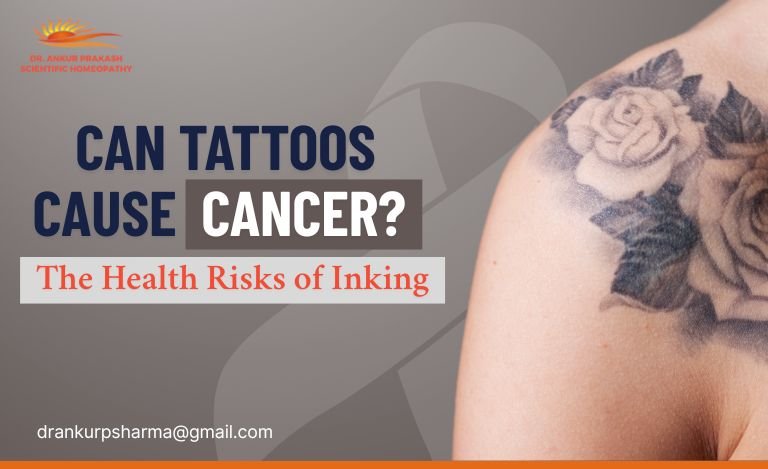Tattoos are a popular form of self-expression, but their growing popularity has raised questions about possible health risks, including cancer. Tattoo inks often contain heavy metals, chemicals, and preservatives that may pose long-term risks once injected into the skin. Some studies suggest that these substances can migrate to lymph nodes or break down into potentially harmful compounds over time, especially with sun exposure or laser treatments. While there is no confirmed direct link between tattoos and cancer, certain ink ingredients have shown carcinogenic potential in laboratory settings.
Beyond cancer concerns, tattoos can also lead to allergic reactions, skin infections, and complications if proper hygiene isn’t maintained. Understanding the composition of inks and choosing reputable tattoo artists can help reduce potential risks and promote safer inking practices.
How Tattoos Might Increase Cancer Risk?
- Chemical Exposure
Tattoo pigments can break down over time, releasing potentially carcinogenic compounds such as formaldehyde, hydrogen cyanide, and aromatic amines. Sunlight (UV exposure) can also degrade ink, forming reactive and harmful chemicals. - Lymph Node Contamination
Nanoparticles from tattoo ink, particularly black or colored inks, can migrate to lymph nodes. Chronic inflammation in lymph nodes is a recognized trigger for some types of cancer. - Mutagenic Reactions
Certain tattoo dyes have shown DNA-damaging potential in lab studies, which could theoretically increase the risk of mutations and cancer over time.
What’s Actually in Tattoo Ink?
- Tattoo inks contain more than just color. Each pigment is a complex chemical cocktail that may include:
Heavy metals: Lead, cadmium, mercury, nickel, chromium, cobalt - Carcinogenic substances: Polycyclic aromatic hydrocarbons (PAHs), such as benzo(a)pyrene
- Azo dyes: These synthetic colorants can break down into cancer-causing aromatic amines
- Nanoparticles: Extremely small particles that can enter the bloodstream or lymphatic system
- Preservatives and alcohol-based solvents
A study conducted by the European Chemicals Agency (ECHA) found that many tattoo inks contain substances classified as carcinogenic, mutagenic, or toxic to reproduction. Unfortunately, tattoo inks are not regulated in the same way as medications or cosmetics in many countries.

Do Tattoos Cause or Increase the Risk of Cancer?
So, do tattoos cause cancer? The answer is complicated.
There is no direct scientific proof that tattoos cause cancer. However, multiple studies indicate an elevated risk due to the presence of certain chemicals and the body’s immune response to them.
Here’s how tattoos might increase cancer risk:
1. Chemical Exposure
- Pigments break down over time and release carcinogenic compounds like formaldehyde, hydrogen cyanide, and aromatic amines.
- UV light from the sun can degrade ink, leading to the formation of reactive and toxic compounds.
2. Lymph Node Contamination
- Studies show that tattoo pigments, especially black and colored nanoparticles, can migrate to lymph nodes — critical components of the immune system.
- This may lead to chronic inflammation, which is a recognized trigger for various types of cancer.
3. Mutagenic Reactions
- Certain dyes have been shown in lab experiments to damage DNA, potentially leading to mutations that increase cancer risk.
While more long-term studies are needed, medical experts now recommend caution — particularly with large tattoos, colored inks, or frequent tattooing.
Can Tattoos Cause Skin Cancer?
A major concern among dermatologists is: can tattoos cause skin cancer?
Here’s what the current evidence says:
- Skin cancer types such as melanoma, basal cell carcinoma, and squamous cell carcinoma have been reported in tattooed skin — but whether the tattoo directly caused the cancer or simply coincided with it is still unclear.
- Tattoos can obscure early signs of melanoma (such as changing moles, color variation, or asymmetry), especially in dark ink. This can delay diagnosis and worsen outcomes.
- Red inks, which often contain mercury-based or azo compounds, may contribute to chronic irritation, potentially increasing cancer susceptibility.
So, while tattoos do not definitively cause skin cancer, they can complicate detection and create conditions that could increase risk in rare cases.

Other Health Risks of Tattoos
Even beyond cancer, tattoos come with other potential risks if proper hygiene or technique isn’t followed:
1. Infections
Using non-sterile needles or contaminated ink can lead to infections like:
Hepatitis B or C
HIV/AIDS
Staph infections
Tuberculosis (in rare cases)
Bacterial infections may appear as redness, swelling, oozing, or fever.
2. Allergic Reactions
Red, green, and yellow pigments are known to cause allergic dermatitis.
Allergic reactions can sometimes develop years after tattooing.
3. Granulomas and Lichenoid Reactions
The body may treat ink particles as foreign objects and form granulomas — small inflamed nodules.
Lichenoid reactions may mimic autoimmune responses.
4. Keloids and Scarring
Individuals with sensitive or darker skin tones are at higher risk for keloid formation — raised, thickened scars that can be painful or itchy.
5. MRI Complications
Some inks, especially those with iron oxide, can cause swelling, itching, or burning during MRI scans.
How to Minimize Tattoo Health Risks?
Before Getting a Tattoo:
- Choose a licensed, certified tattoo artist and studio.
- Use pre-sealed, sterile needles and disposable gloves.
- Research ink brands that meet safety standards (e.g., REACH-compliant).
- Avoid tattooing over moles, scars, or lesions.
- Get a patch test for colored inks to rule out allergies.
Aftercare & Monitoring:
- Follow strict aftercare: gentle washing, avoid picking scabs, moisturize.
- Protect tattoos from sunlight, especially while healing.
- Check tattooed areas regularly for lumps, color changes, itching, or bleeding.
- Schedule annual dermatologist visits for full skin checks.
Tattoos & Cancer: Expert Recommendations by Dr. Ankur Prakash
Dr. Ankur Prakash encourages people to think of tattooing as a semi-medical procedure, not just body art. His advice:
- Always verify the quality and origin of tattoo inks.
- Avoid impulsive decisions — your tattoo will stay with you for life, and so will any health effects.
- Consider natural, mineral-based inks as safer alternatives.
Get professional skin screenings if you already have tattoos and notice unusual symptoms.
Final Thought
So, Can Tattoos Cause Cancer?
The current evidence shows that tattoos are not directly proven to cause cancer, but they may increase potential risks depending on ink composition, the body’s reaction, and external factors like sunlight or infections. More importantly, can tattoos cause skin cancer? While not directly, tattoos can sometimes hide symptoms or contribute to skin changes that go unnoticed.
For those concerned about long-term health, considering Homeopathic Cancer Treatment in India as a preventive or supportive approach can be helpful alongside regular monitoring. Ultimately, awareness and caution are key — millions of people live healthy lives with tattoos, but informed decisions make all the difference.








